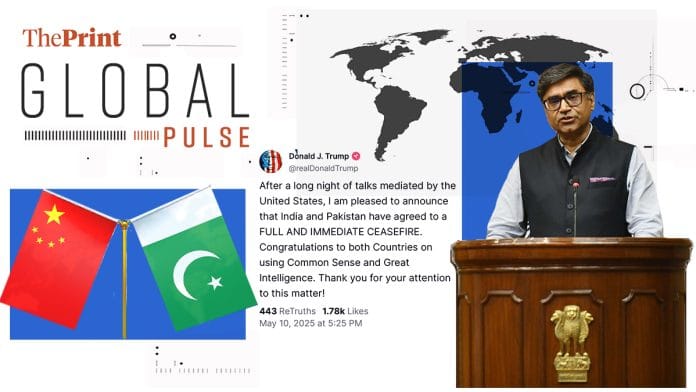New Delhi: The India-Pakistan ceasefire, which President Donald Trump was quick to claim as being mediated by the US, was broken soon after, report Niha Masih, Rick Noack, Karishma Mehrotra, Shams Irfan and Maham Javaid in The Washington Post.
“Indian media reported shelling at the Line of Control. Indian Foreign Secretary Vikram Misri told reporters Saturday night that Pakistan had already violated the ceasefire repeatedly and Indian armed forces were ‘giving an adequate and appropriate response’. Pakistani information minister Attaullah Tarar, speaking to local media, called the accusation ‘baseless’,” says The Post.
Despite the “alleged breaches” that have been denied by Pakistan—the Financial Times reports that the ceasefire appeared to be holding.
“The agreement called a halt to a conflict that India painted as an essential showdown with a country it accuses of supporting cross-border terrorism, and that Pakistan said was a justifiable defence against an aggressive India accusing it of a crime it did not commit,” note John Reed, Krishn Kaushik, Humza Jilani and Guy Chazan in the FT.
300-400 drones sent by Pakistan to India and the most “significant of all”—explosions in Rawalpindi’s Nur Khan Air Base—led Trump and US Secretary of State Marco Rubio to intervene in the India-Pakistan clashes, report David E. Sanger, Julian E. Barnes and Maggie Haberman in The New York Times.
“One former American official long familiar with Pakistan’s nuclear program noted on Saturday that Pakistan’s deepest fear is of its nuclear command authority being decapitated. The missile strike on Nur Khan could have been interpreted, the former official said, as a warning that India could do just that,” states the report.
While an uneasy agreement to halt hostilities was reached between the two countries, The Economist noted that “a foreign brokered ceasefire will not lead easily to a more enduring peace.”
“And the confrontation may have laid the ground for a more dangerous one in the future,” it said.
Meanwhile, China celebrated “an unprecedented military success”, reports The Telegraph.
“The Chinese delegation, roused from their sleep by the outbreak of conflict between two nuclear-armed nations, was thrilled with the success of the Pakistani defence,” Pakistan Deputy PM and Foreign Minister Ishaq Dhar tells the newspaper.
The majority of Pakistan’s arms are procured from China.
“The big advantage the Pakistanis have is that their primary weapon supplier is China,” Dr Walter Ladwig, an associate fellow at the Royal United Services Institute, a London-based think tank, is quoted as saying to The Telegraph.
(Edited by Zinnia Ray Chaudhuri)
Also read: India-Pakistan conflict is now ‘expansive’. Global media says drones could reshape hostilities






